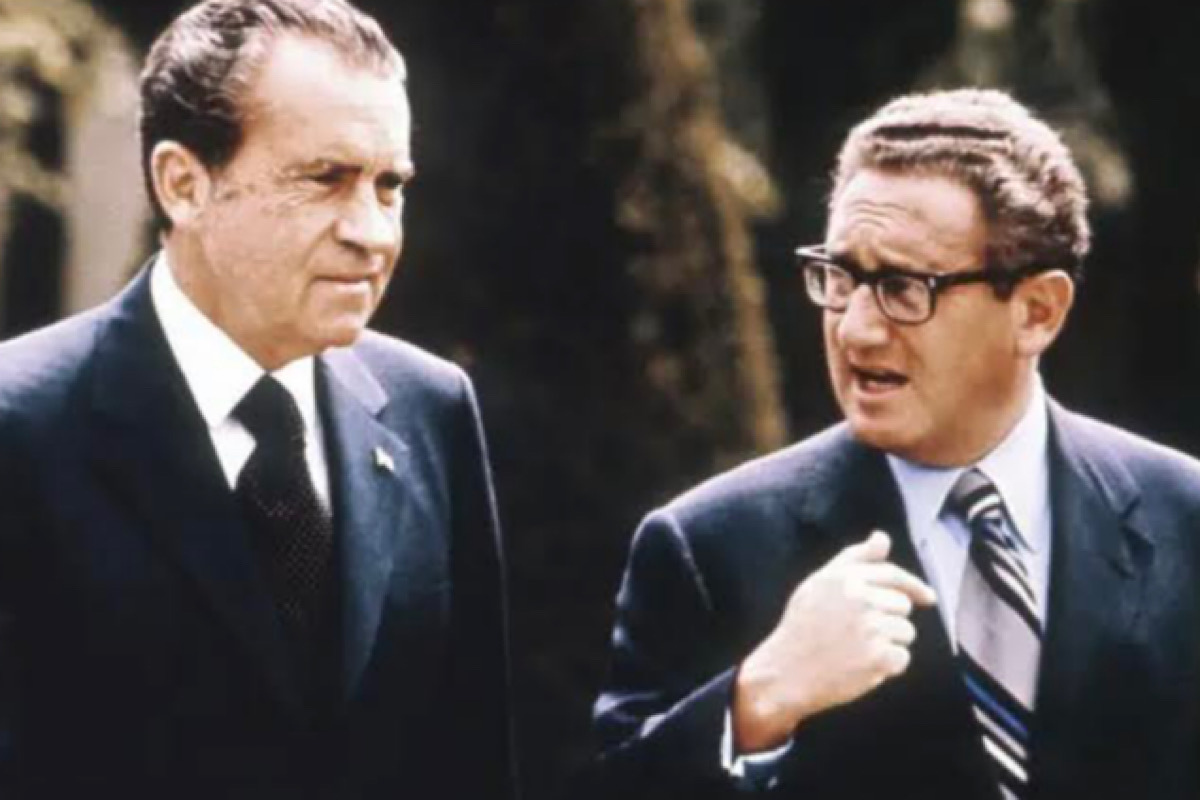After the military crackdown in East Pakistan in March 1971, the terrible news of the bloodbath in East Pakistan, both from internal diplomatic sources and news outlets, though primarily from the Dhaka consulate and the media, the dilemma of the Nixon administration became acute.
Historically Pakistan had been a steadfast ally of the US since the beginning of the Cold War and a member of the Baghdad Pact, an important geographical extension of Truman’s Containment Doctrine incorporating an alliance of Southwest Asian nations to checkmate USSR from the Dardanelles to the Himalayas. It was in sharp contrast to India’s doctrine of non-alignment which the US foreign policy formulators thought to be primarily an antagonistic amalgamation of nations including some communist ones.
But apart from these general considerations, Pakistan was of pivotal importance for Nixon for his new foreign policy initiatives and his secret plan to use Yahya Khan to act as a mediator between the USA and China. An important shift from the policy of containment to engagement and diplomatic accommodation of China were the most important considerations in Nixon’s policy.
Nixon watched keenly and reflected on the widening gulf between USSR and China including ideological differences and border clashes and also Soviet withdrawal from the Chinese nuclear programme. He envisaged a policy change to end Chinese isolation and thereby weaken the Soviet influence and power in a significant manner.
To achieve this goal Pakistan at that juncture was of crucial importance. It was a moment of great convergence of interest between the USA and Pakistan, as both thought of a close partnership that would be mutually beneficial. Even Nixon’s personal image of Yahya Khan was extremely favourable as he considered him a great leader with comprehensive knowledge of both the USSR and China. But the carnage in East Pakistan and Yahya’s brutal action to suppress a civilian population was too serious to be ignored by the President and his advisors.
But surprisingly, the Nixon Kissinger duo supported Yahya Khan’s suppression of the Awami League. Kissinger believed that terror tactics would be a success. Nixon endorsed Kissinger’s assessment. Kissinger went to the extent of being critical of Archer Blood, the Consul General who was aware of the grim situation and was sending a realistic appraisal of the situation. Even Nixon ignored the grim warning signals from Dhaka.
However, the Consul General and his staff refused to watch in silence the slaughter of the unarmed local population. “The Blood Telegram” which was sent on 16 April 1971 was a serious indictment of Washington’s calculated silence. Signed by 29 members of the consulate it categorically castigated Washington’s silence. It charged the government for its failure “to denounce the suppression of democracy”. It added “our government has failed to denounce atrocities.
Our government has failed to take forceful measures to protect its citizens, while at the same time bending over backwards to placate the (West Pakistani) dominated government and to a lesser likely and deservedly negative international public relations impact against them”. It called the army crackdown a genocide, reminded Washington of the USA’s “true and lasting interests” and appealed “to salvage our nation’s position as a moral leader of the free world”, Interestingly, the telegram also cautioned the policy makers at Washington that the gruesome actions would likely end in a colossal failure ending with the creation of a new nation. It reminded that “at the moment we possess the goodwill of the Awami League” and that it “would be foolish to forfeit this asset by pursuing a rigid policy of one-sided support to the likely loser”. Washington’s response was an angry rebuttal.
Kissinger was more worried about its likely advantages to the Democratic Party’s Presidential candidate Edward Kennedy for the 1972 election, rather than contemplating a reasonable response to a grave situation. Secretary of State William Rogers dismissed it as an internal matter of Pakistan. He also contended that it was not a one-sided affair, as atrocities were being perpetrated by both sides.
Blood sent a carefully worded rebuttal. He questioned the legitimacy of the Yahya Khan government and rejected the contention that it was an internal matter. He reiterated it was a genocide where both members of the Hindu minority and Awami League members were being slaughtered. Even the CIA thought it was practically impossible for the West Pakistan administration to regain control of East Pakistan.
Blood added “the refusal of Pakistan’s military leaders to honour (election of 1970) and their attempt to terrorize the Bengalis into submission have almost certainly ended any general desire in East Bengal to see the Pakistan Union continue”. It even warned that an Indian intervention might take place. It categorically stated “it is one assessment that Pakistan as a unitary state cannot survive”.
The isolation of the White House became more and more precarious as there were powerful voices both in the political arena and the press seeking quick positive action. Joan Baez’s popular song on Bangladesh reflected the popular mood. In July 1971, Ted Kennedy charged the Nixon administration with whitewashing “one of the greatest nightmares in modern times”. Immediately after, in August, he visited the camps of Bangladeshi refugees in East India, mostly in West Bengal.
He confirmed every single line of the Blood Report. In spite of all these misdeeds, Islamabad continued to receive military spare parts and ammunition from the USA. But instead of using the leverage over Yahya Khan, they did nothing and surprisingly criticized the growing condemnations of their policies. Kissinger even went to the extent of stating that the Dhaka consulate action was “an open rebellion”. Nixon was also agitated and rejected any plan of intervention or change in US policy.
Kissinger cautioned that “for us to cut off aid would infuriate the West Pakistanis”. But the officials in the State Department were convinced that a break-up was inevitable. Kissinger meanwhile sent his recommendation to the President on 28 April 1971. He still thought a negotiated settlement was possible and did not advise against shipments of military hardware. Nixon agreed with it and continued to support the Yahya Khan government.
The behaviour of Nixon and Kissinger emanated from a number of carefully considered policy implications linked to the Cold War. Pakistan being a reliable alliance partner was a major consideration. It was a constant irritant against an unreliable India. The latter’s policy of non-alignment and close ties with the Soviet Union and pro-India tilt of the Awami League were seen as geopolitical disasters for the USA.
However, the most decisive reason for the Nixon administration’s silence and for propping Yahya Khan’s regime for at least six more months was because of the indispensability of Pakistan to reestablish and normalize ties with China. Kissinger’s secret visit to Beijing was through Pakistan. American national interest negated any other considerations including genocide and gross violation of human rights.
Nixon prioritized foreign policy activism with a belief that the US, because of its exceptionalism and because it was a nation with minor contradictions, did not need a President for its domestic policy. This motivated him to support Yahya Khan. This, he did in the background of the growing domestic criticism of the Vietnam War and the prospect of imminent defeat.
There was also desperation and the desire to gamble in the hope that normalization of ties with China would create massive domestic support. Chamberlain sums it up well, “Bangladesh would become a casualty of Nixon and Kissinger’s Cold War strategy”. Kissinger with all his sense of historical progress proved to be on the wrong side of history.
(The writer is a retired Professor of Political Science, University of Delhi)











